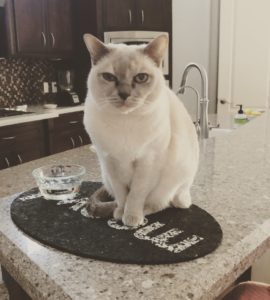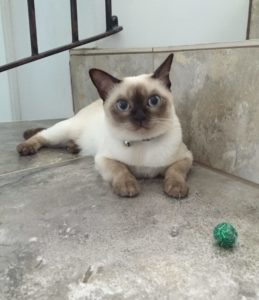Help For Finicky Cats

Lili has a special spot just for her at meal times.
If your cats are like most, meal time is something they look forward to. In fact, cats have an incredible sense of knowing their meal schedule and like to remind us, especially on the weekends. At 6 am. It’s as if they’re hardwired with the ability to tell time and don’t care if it’s Saturday and you prefer to sleep in. Some cats, like our twins Rocket and Gunner, wouldn’t miss a meal. However, other cats are downright picky eaters, and it drives cat parents crazy! If you have a finicky cat, here are some helpful tips.
The most overlooked reason cats are finicky eaters
By far, the number one reason I find that cats are finicky eaters is often the one thing that is overlooked: food sensitivity. Here’s an example. Off and on over the years our cats have been really good eaters at mealtime. They get a variety of proteins and high quality food that they like. Suddenly, one day instead of devouring their favorite food they sniff it, look at me, whine, and wait for me to offer them something else. Muscle testing helps me determine if they are sensitive to it, and this is normally the case. Fortunately, I am able to remove the sensitivity with an energy medicine technique, and usually within 24-48 hours they have no problem eating that food again.
Sometimes it’s all about the food
Textures. The second reason your cat may seem finicky really revolves around texture preferences. Some cats prefer pate’, others like bite-sized morsels with gravy. Other cats like big chunky bites of meat. Have you noticed which type/s your cat enjoys most?
Boredom. This leads to yet another reason cats are finicky: they get tired of eating the same thing day in and day out. Rotating proteins can provide a better balance of nutrients, vitamins and minerals, and it also alleviates the potential to one day decide they don’t like it anymore. As humans, if we ate the same food every meal, every day, we’d get sick of it, too. What makes us think our cats wouldn’t either?
Temperature. The temperature of the food can also be important. If you are feeding a refrigerated product most cats don’t want to eat it cold. Therefore, let it sit out and come to room temperature first. Or find a way to warm it up just a bit. Aroma can be very enticing and make the food more appealing.
Other things to consider for finicky cats
Location. Where you feed your cat may also be important. Our cat, Lili, used to get nervous eating in the floor. The moment we turned our backs Rocket or Gunner would come over and try to steal her food. Being the shy type, she would just walk away. When we moved her bowl to the counter where she had privacy and space, her confidence improved. So did her appetite! Therefore, consider the location where you’re feeding your cat and if there are other cats are being intimidating.
Dishes. Another factor to consider is the type of food bowl or dish you’re using. Some cats’ whiskers are especially sensitive to touching the sides of the bowl when they eat. Known as whisker fatigue, it can easily be remedied by serving food on a flat or concave shaped dish instead of a bowl. Experiment with different types of plates and dishes to see which one your kitty prefers.

Aylen gets the zoomies before meals.
Exercise. Surprisingly, some cats simply prefer a little playtime or exercise before they eat. I’ve seen this first hand in our cat, Aylen. She enjoys zooming around the house or playing with a toy to build up her appetite first. Unlike Rocket and Gunner, she may wait 30 minutes after I’ve put food in her bowl before she’s ready to eat. Sometimes she eats half and comes back 20 minutes later to eat the rest.
Free-feeding is a deal-breaker for picky cats
Finally, if you’re free-feeding your kitty and allowing her to graze all day long, this is working against you! Cats in the wild hunt, catch, kill, eat and fast. With domesticated cats we’ve changed their innate behavior, and now they rely on us to do these things for them. Over 80% of cat owners feed dry cat food, and it would be my guess that most leave dry food out all day. I hear it all the time from clients: “My cat needs to eat during the day while I’m gone.” The first thing to change in situations like this is to create a feeding schedule, and by simply NOT giving cats something to graze on all the time will ensure they are hungry at mealtimes! Hungry cats are much more likely to eat what you’re serving if all other factors above are addressed.
Just like all cats have different personalities, mealtime preferences can be just as unique. My advice is to become really good at observing your cat, and try making some adjustments using the recommendations above. If you believe your cat may have a food sensitivity reach out to me for a Mind Body Spirit Release Session. Energy work and healing can do wonders! There’s no sense in feeding expensive, limited ingredient diets when you can just remove the sensitivity to begin with. As an added precaution, if your cat goes more than a day without eating make sure you see the vet to rule out a more serious disease or life-threatening condition.
Do you have a finicky cat? What have you tried, and was it successful? Share in the comments below!

